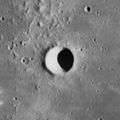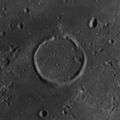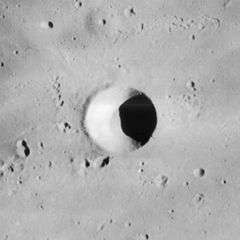Hortensius (crater)
|
Lunar Orbiter 4 image (Note also lunar dome at top center) | |
| Coordinates | 6°30′N 28°00′W / 6.5°N 28.0°WCoordinates: 6°30′N 28°00′W / 6.5°N 28.0°W |
|---|---|
| Diameter | 15 km (9 mi) |
| Depth | 2.9 km (1.8 mi) |
| Colongitude | 28° at sunrise |
| Eponym | Martin van den Hove |
.png)
Hortensius is a small, bowl-shaped lunar impact crater that is located in the northern part of the Mare Insularum. It lies some distance to the west-southwest of the prominent crater Copernicus. Hortensius is circular and cup-shaped, with a small floor at the midpoint of the sloping interior walls. The interior has a higher albedo than the surrounding lunar mare, despite traces of ray material from Copernicus.
To the north of this feature is a collection of six lunar domes, many having a tiny craterlet at the summit. These are shield volcanoes that were formed by a highly viscous type of lava. The domes are generally circular in form, with a diameter of 6–8 kilometers (4–5 mi), and rising as high as 400 meters (1300 ft). They are formed of the same material as the surrounding mare, although from a different process.
Satellite craters
By convention these features are identified on lunar maps by placing the letter on the side of the crater midpoint that is closest to Hortensius.
| Hortensius | Latitude | Longitude | Diameter (km) | Diameter (mi) |
|---|---|---|---|---|
| A | 4.4° N | 30.7° W | 10 km | 6 mi |
| B | 5.3° N | 29.5° W | 6 km | 4 mi |
| C | 6.0° N | 26.7° W | 7 km | 4 mi |
| D | 5.4° N | 32.3° W | 6 km | 4 mi |
| E | 5.2° N | 25.4° W | 15 km | 9 mi |
| F | 7.1° N | 25.6° W | 6 km | 4 mi |
| G | 8.1° N | 26.1° W | 4 km | 2½ mi |
| H | 5.9° N | 31.1° W | 6 km | 4 mi |
 Lunar Orbiter 4 image of Hortensius A
Lunar Orbiter 4 image of Hortensius A Lunar Orbiter 4 image of Hortensius E
Lunar Orbiter 4 image of Hortensius E
References
- Andersson, L. E.; Whitaker, E. A. (1982). NASA Catalogue of Lunar Nomenclature. NASA RP-1097.
- Blue, Jennifer (July 25, 2007). "Gazetteer of Planetary Nomenclature". USGS. Retrieved 2007-08-05.
- Bussey, B.; Spudis, P. (2004). The Clementine Atlas of the Moon. New York: Cambridge University Press. ISBN 978-0-521-81528-4.
- Cocks, Elijah E.; Cocks, Josiah C. (1995). Who's Who on the Moon: A Biographical Dictionary of Lunar Nomenclature. Tudor Publishers. ISBN 978-0-936389-27-1.
- McDowell, Jonathan (July 15, 2007). "Lunar Nomenclature". Jonathan's Space Report. Retrieved 2007-10-24.
- Menzel, D. H.; Minnaert, M.; Levin, B.; Dollfus, A.; Bell, B. (1971). "Report on Lunar Nomenclature by the Working Group of Commission 17 of the IAU". Space Science Reviews. 12 (2): 136–186. Bibcode:1971SSRv...12..136M. doi:10.1007/BF00171763.
- Moore, Patrick (2001). On the Moon. Sterling Publishing Co. ISBN 978-0-304-35469-6.
- Price, Fred W. (1988). The Moon Observer's Handbook. Cambridge University Press. ISBN 978-0-521-33500-3.
- Rükl, Antonín (1990). Atlas of the Moon. Kalmbach Books. ISBN 978-0-913135-17-4.
- Webb, Rev. T. W. (1962). Celestial Objects for Common Telescopes (6th revised ed.). Dover. ISBN 978-0-486-20917-3.
- Whitaker, Ewen A. (1999). Mapping and Naming the Moon. Cambridge University Press. ISBN 978-0-521-62248-6.
- Wlasuk, Peter T. (2000). Observing the Moon. Springer. ISBN 978-1-85233-193-1.
